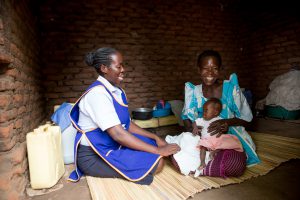New Peer-Reviewed Article Examines Impact of Lay Health Workers programmes including mothers2mothers Model
mothers2mothers (m2m) is excited to share that Dr Kathrin Schmitz, our Director of Programmes and Technical Support, is the lead author of a peer-reviewed article published in online journal PLOS One (Click here to read it). The article is a scoping review of lay health worker (LHW) programmes on the health outcomes of HIV-exposed mothers and children in sub-Saharan Africa. By synthesising the results of existing studies on the topic, the scoping review highlights some of the key impacts such LHW programmes—including our own Mentor Mother Model—have made in the past decade, including increasing access to prevention of mother-to-child transmission of HIV (PMTCT) services, reducing mother-to-child transmission rates, and delivering health education.

Through our peer-based Mentor Mother Model, m2m employs HIV-positive women to serve as frontline health workers so that services are delivered by people from the same community as those they serve. In this photograph, an m2m Mentor Mother visits a client at her home in Busia, Uganda.
m2m chose to prepare this article as part of our ongoing commitment to creating a deeper understanding of the importance and impact of peer-based models of healthcare delivery. The article was a joint effort by m2m and expert authors from two of South Africa’s leading universities—the University of the Witwatersrand and the University of the Western Cape. The team began by searching articles submitted to seven leading databases between January 2008 and July 2018. Hundreds of articles were long-listed for inclusion, but after a rigorous selection process, only 33 were finally included. Studies selected for inclusion in the review were robust academic studies from eight relevant countries which followed well-regarded techniques to establish impact of LHW programmes, such as random control testing or cohort studies.
The scoping review found evidence that LHW programmes deliver multiple benefits, including: Increased uptake of PMTCT and family planning services, improved retention in care, better mental health for mothers, and an increase in exclusive breastfeeding. Mixed or inconclusive results were found in the areas of treatment adherence and viral suppression, marking these out as an area for programmatic innovation or further study.
We are excited about the findings of the review, as it gives us further confidence that our peer-based model of healthcare delivery can indeed deliver positive outcomes for our target clients. We hope it will prove valuable for all working in this field, and we invite comments and feedback to Dr Kathrin Schmitz via email: [email protected].






















